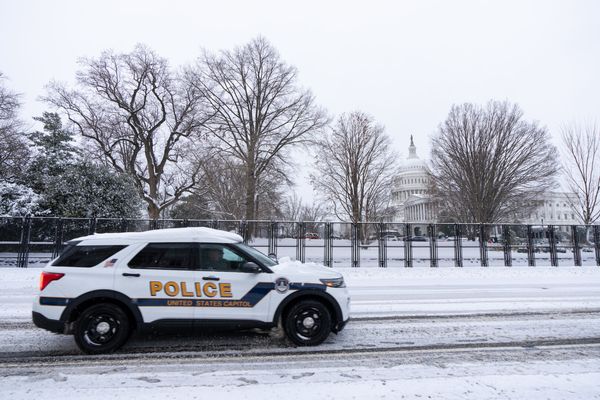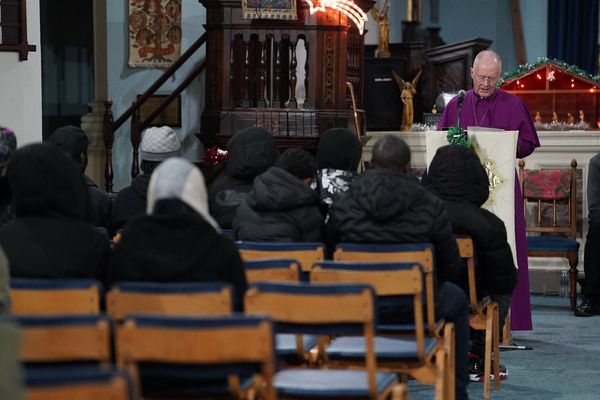WASHINGTON – California voters are deciding now if Gov. Gavin Newsom gets to keep his job. Their verdict could reverberate far beyond the state.
Top officials from both parties are preparing to parse the results of next month’s unexpectedly competitive recall election for what it means for next year’s midterm election, control of the U.S. Senate, and a Democratic Party that once thought it had a tight grip on the country’s largest state.
Adding to the scrutiny is a growing sense, bolstered by polls, that the Democrats’ and President Joe Biden’s political fortunes have waned in recent months because of a resurgent coronavirus pandemic and the tumultuous exit from Afghanistan. A loss for Newsom in deep blue California would underline the view that a party that won unified control of Washington less than a year ago is already facing a voter-led backlash.
“It’s one of these moments that people outside of California are doing a double take and saying, ‘Wait a second, how are we even having a conversation about a Republican winning in California?’” said Tyler Law, a Democratic strategist.
Law and other strategists caution against over-interpreting the results of the race, pointing out that an odd-year election has a unique mix of factors that make it an imperfect indicator of the national political climate.
But some of them also acknowledge surprise at the race’s razor-thin margins as it enters the home stretch, in what has become one of the country’s biggest political stories this summer. To survive, Newsom needs a majority of voters to oppose the recall, but recent polls show it’s too close to call.
If a majority of voters support the recall, then they will pick one of 46 candidates on the ballot to become governor. Former conservative talk radio host Larry Elder has the most support among them, even as polls show him receiving less than 30% of the vote in the divided field.
A Republican victory in a state where the GOP hasn’t held statewide office in more than a decade would send shockwaves through the country, Newsom advisers say.
“It really is a bellwether for ‘22,” said Sean Clegg, a senior Newsom strategist. “We have a turnout problem. The recall is all about the turnout challenge. And whether we’re successful or unsuccessful has huge national implications.”
It’s part of the reason he’s recruited some of the party’s top leaders to help his campaign, including Vice President Kamala Harris, who will rally for the governor Friday in the Bay Area.
Sen. Elizabeth Warren of Massachusetts, a former presidential candidate, has appeared in a TV ad for Newsom.
Biden is also expected to campaign for Newsom, though the White House has yet to announce details of his trip.
Turnout wasn’t a problem for Democrats during the tenure of former President Donald Trump, whose policy agenda and behavior in office elicited a fierce backlash from rank-and-file liberals that helped ensure he lost re-election last year.
Newsom has tried to use the specter of Trump to motivate the party’s base once again, saying that his replacement would be nothing more than a clone of the former president.
But that argument hasn’t put the race out of reach, giving Washington-based Republicans hope that Trump may no longer be the electoral boogeyman he once was in blue areas where the former president was most unpopular. Moving out of Trump’s shadow is important, they add, for many of the more moderate and suburban voters the party lost ground with while the last president was in office.
“It shows the ability to make their opponents Donald Trump 2.0, and have that be enough to coast to victory, is no longer a sure thing,” said Colin Reed, a longtime Republican strategist.
Reed worked on one of the most memorable special elections in recent history, when Republican Scott Brown in 2010 won a Senate race in Democratic-heavy Massachusetts. The shock victory of a GOP candidate that year offered an early glimpse of the success the Republican Party would have later that year, when they swept to huge victories in the midterm election and took control of the House majority.
But other special elections — or any non-traditional race like a gubernatorial recall — have had much less predictive value. Just last year, Democrats unexpectedly lost a special House race in suburban Los Angeles, less than six months before the general election. Biden still won California by a comfortable margin and managed victories in former Republican strongholds of Arizona and Georgia on his way to winning the presidency.
Even Republicans like Reed say that, although they’re excited about the closeness of the California race, they still aren’t ready to predict a wave of Republican victories next year.
“You can try your hardest to peer into them and extrapolate out some themes that might or might not apply to races down the road,” Reed said. “But special elections are special elections.”
Democratic National Committee officials also downplayed the election as a bellwether for next year, arguing that the unusual September timing and idiosyncratic rules of a recall race mean it has little in common with federal races.
“This election is about Governor Newsom and his strong track record of delivering for the people of California,” said DNC spokeswoman Brooke Goren.
But the recall race will affect more than perceptions of the 2022 midterm. Newsom advisers point out that if Sen. Dianne Feinstein, who is 88, leaves office during her term with a Republican as governor, the GOP will get to pick the state’s next senator.
With the Senate split 50-50, they add, that could be disastrous for Democrats.
“If we get a Trump Republican governor, we have the oldest longest serving member of the United States Senate, bad events could lead immediately to Mitch McConnell being back in the chair,” Clegg said. “So the stakes are immediate, but they’re also really, really important for next year.”
A spokesman for Feinstein’s office reiterated Tuesday that the senator has said she does not plan to step down from office.
More broadly, a defeat for Newsom would also rob the national Democratic Party of arguably the nation’s most important governorship, Democrats say, at a time when the president’s approval ratings are slipping and the party is struggling to pass a pair of massive spending bills through an evenly divided Congress.
“The stakes are extremely high,” Law said. “This is a state that has led the nation in policy innovation and consumer regulation, environmental regulations. So losing control would be a huge deal.”
Ludovic Blain, executive director of California Donor Table, a group that funds organizing efforts targeting people of color, said Newsom losing “would have huge national impacts,” especially because it would be a blow in the home state of so many top Democrats in Washington, such as House Speaker Nancy Pelosi and Health and Human Services Secretary Xavier Becerra.
“This is one of the leading places in America where we have a relatively functioning multiracial democracy,” Blain said of California. “Gavin losing would put a big anchor around the (Biden) administration’s neck.”
____







